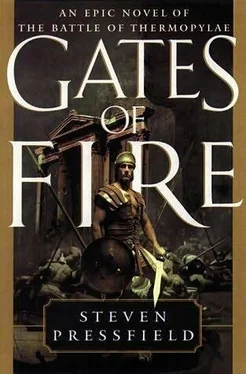Steven Pressfield - Gates of Fire - An Epic Novel of the Battle of Thermopylae
Здесь есть возможность читать онлайн «Steven Pressfield - Gates of Fire - An Epic Novel of the Battle of Thermopylae» весь текст электронной книги совершенно бесплатно (целиком полную версию без сокращений). В некоторых случаях можно слушать аудио, скачать через торрент в формате fb2 и присутствует краткое содержание. Жанр: Историческая проза, на английском языке. Описание произведения, (предисловие) а так же отзывы посетителей доступны на портале библиотеки ЛибКат.
- Название:Gates of Fire: An Epic Novel of the Battle of Thermopylae
- Автор:
- Жанр:
- Год:неизвестен
- ISBN:нет данных
- Рейтинг книги:3 / 5. Голосов: 1
-
Избранное:Добавить в избранное
- Отзывы:
-
Ваша оценка:
- 60
- 1
- 2
- 3
- 4
- 5
Gates of Fire: An Epic Novel of the Battle of Thermopylae: краткое содержание, описание и аннотация
Предлагаем к чтению аннотацию, описание, краткое содержание или предисловие (зависит от того, что написал сам автор книги «Gates of Fire: An Epic Novel of the Battle of Thermopylae»). Если вы не нашли необходимую информацию о книге — напишите в комментариях, мы постараемся отыскать её.
Gates of Fire: An Epic Novel of the Battle of Thermopylae — читать онлайн бесплатно полную книгу (весь текст) целиком
Ниже представлен текст книги, разбитый по страницам. Система сохранения места последней прочитанной страницы, позволяет с удобством читать онлайн бесплатно книгу «Gates of Fire: An Epic Novel of the Battle of Thermopylae», без необходимости каждый раз заново искать на чём Вы остановились. Поставьте закладку, и сможете в любой момент перейти на страницу, на которой закончили чтение.
Интервал:
Закладка:
It was clear now that Diomache could not walk. Bruxieus took her up in his arms. Another of the Argives pressed a hard bread into my hands. Two more regiments will be coming from the south tomorrow. Get into the mountains and go north, don't come down till you're out of Akarnania.
He spoke kindly, as if to his own son. If you find a town, don't bring the girl in or this will happen again.
I turned and spat on his dark stinking tunic, a gesture of powerlessness and despair. He caught my arm as I turned away. And get rid of that old man. He's worthless. He'll only wind up getting you and the girl killed.
Chapter Five
They say that ghosts sometimes, those that cannot let go their bond to the living, linger and haunt the scenes of their days under the sun, hovering like substanceless birds of carrion, refusing Hades' command to retire beneath the earth. That is how we lived, Bruxieus, Diomache and I, in the weeks following the sack of our city. For a month and more, for most of that summer we could not quit our vacated polis. We roamed the wild country above the agrotera, the marginal wastes surrounding the cropland, sleeping in the day when it was warm, moving at night like the shades we were. From the ridgeUnes we watched the Argives move in below, repopulating our groves and farmsteads with the excess of their citizenry.
Diomache was not the same. She would wander away by herself, into the dark glades, and do unspeakable things to her womanly parts. She was trying to dispatch the child that might be growing inside her. She thinks she has given offense to the god Hymen, Bruxieus explained to me when I broke in upon her one day and she chased me with curses and a hail of stones. She fears that she may never be a man's wife now but only a slave or a whore. I have tried to tell her this is foolishness, but she will not hear it, coming from a man.
There were many others like us in the hills then. We would run into them at the springs and try to resume the fellow-feeling we had shared as Astakiots. But the extinction of our polis had severed those happy bonds forever. It was every man for himself now; every clan, every kin group.
Some boys I knew had formed a gang. There were eleven of them, none more than two years older than I, and they were holy terrors. They carried arms and boasted that they had killed grown men. They beat me up one day when I refused to join them. I wanted to, but couldn't leave Diomache. They would have taken her in too, but I knew she would never go near them.
This is our country, their boy-lord warned me, a beast of twelve who called himself Sphaireus, Ball Player, because he had stuffed in hide the skull of an Argive he had slain, and now kicked about with him the way a monarch bears a skeptron. He meant his gang's country, the high ground above the city, beyond the reach of Argive armor. If we catch you trespassing here again, you or your cousin or that slave, we'll cut out your liver and feed it to the dogs.
At last in fall we put our city behind us. In September when Boreas, the North Wind, begins to blow. Without Bruxieus and his knowledge of roots and snares, we would have starved.
Before, on my father's farm, we had caught wild birds for our cote, or to make breeding pairs, or just to hold for an hour before returning them to freedom. Now we ate them. Bruxieus made us devour everything but the feathers. We crunched the little hollow bones; we ate the eyes, and the legs right down to the boot, discarding only the beak and the unchewable feet. We gulped eggs raw. We choked down worms and slugs. We wolfed grubs and beetles and fought over the last lizards and snakes before the cold drove them underground for good. We gnawed so much fennel that to this day I gag at a whiff of that anisey smell, even a pinch flavoring a stew. Diomache grew thin as a reed.
Why won't you talk to me anymore? I asked her one night as we tramped across some stony hillside. Can't I put my head in your lap like we used to?
She began to cry and would not answer me. I had made myself an infantryman's spear, stout ash and fire-hardened, no longer a boy's toy but a weapon meant to kill. Visions of revenge fed my heart. I would live among the Spartans. I would slay Argives one day. I practiced the way I had seen our warriors do, advancing as if on line, an imaginary shield before me at high port, my spear gripped strong above the right shoulder, poised for the overhand strike. I looked up one dusk and there stood my cousin, observing me coldly. You will be like them, she said, when you grow. She meant the soldiers who had shamed her. I will not!
You will be a man. You won't be able to help yourself. One night when we had tramped for hours, Bruxieus inquired of Diomache why she had held herself so silent. He was concerned for the dark thoughts that might be poisoning her mind. She refused to speak at first. Then, at last relenting, told us in a sweet sad voice of her wedding, She had been planning it in her head all night. What dress she would wear, what style of garland, which goddess she would dedicate her sacrifice to. She had been thinking for hours, she told us, of her slippers. She had all the strapping and bead-work worked out in her mind. They would be so beautiful, her bridal slippers!
Then her eyes clouded and she looked away. This shows what a fool I have become. No one will marry me.
I will, I proffered at once. She laughed. You? A fair chance of that! Foolish as it sounds to recount, to my boy's heart these careless words stung like no others in my life. I vowed that I would marry Diomache one day. I would be man enough and warrior enough to protect her.
For a time in autumn we tried surviving on the seacoast, sleeping in caves and combing the sloughs and marshes. You could eat there at least. There were shellfish and crabs, mussels and spinebacks to be prised from rocks; we learned how to take gulls on the wing with stakes and nets. But the exposure was brutal as winter came on. Bruxieus began to suffer. He would never let his weakness show to Diomache and me when he thought we were looking, but I would watch his face sometimes when he slept. He looked seventy. The elements were hard on him in his years; all the old wounds ached, but more than that he was donating his substance to preserve ours, Diomache's and mine. Sometimes I would catch him looking at me, studying a tilt to my face or the tone of something I had said. He was making sure I hadn't gone crazy or feral.
As the cold came on, it became more difficult to find food. We must beg. Bruxieus would pick out an isolated farmstead and approach the gate alone; the hounds would converge in a clamorous pack and the men of the farm would emerge, on guard, from the fields or from some rude falling-down outbuilding; brothers and a father, their callused hands resting on the tools which would become weapons if the need arose. The hills were infested with outlaws then; the farmers never knew who would walk up to their gate and with what duplicitous intent. Bruxieus would doff his cap and wait for the woman of the house, making sure she took note of his milky eyes and beaten posture. He would indicate Diomache and me, shivering miserably in the road, and ask the mistress not for food, which would have made us beggars in the landsmen's eyes and prompted them loosing the dogs on us, but for any broken item of use that she could spare – a rake, a thrashing staff, a worn-out cloak, something we could repair and sell in the next town. He made sure to ask directions and appear eager to be moving on. That way they knew any kindness would not make us linger. Almost always the farm wives volunteered a meal, sometimes inviting us in to hear what news we bore from foreign places and to tell us their own.
It was during one of those forlorn feedings that I first heard the word Sepeia. This is a place of Argos, a wooded area near Tiryns, where a battle had just been fought between the Argives and the Spartans. The boy who bore this tale was a farmer's visiting nephew, a mute, who communicated through signs and whom even his own family could barely comprehend. The Spartans under King Kleomenes, the boy gave us to understand, had achieved a spectacular victory. Two thousand Argives dead was one figure he had heard, though others had it at four thousand and even six. My heart exploded with joy. How I wished I could have been there! To have been a man grown, advancing in that battle line, mowing down in fair fight the men of Argos, as they had cut down by perfidy my own mother and father.
Читать дальшеИнтервал:
Закладка:
Похожие книги на «Gates of Fire: An Epic Novel of the Battle of Thermopylae»
Представляем Вашему вниманию похожие книги на «Gates of Fire: An Epic Novel of the Battle of Thermopylae» списком для выбора. Мы отобрали схожую по названию и смыслу литературу в надежде предоставить читателям больше вариантов отыскать новые, интересные, ещё непрочитанные произведения.
Обсуждение, отзывы о книге «Gates of Fire: An Epic Novel of the Battle of Thermopylae» и просто собственные мнения читателей. Оставьте ваши комментарии, напишите, что Вы думаете о произведении, его смысле или главных героях. Укажите что конкретно понравилось, а что нет, и почему Вы так считаете.












